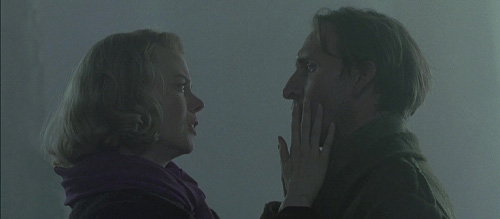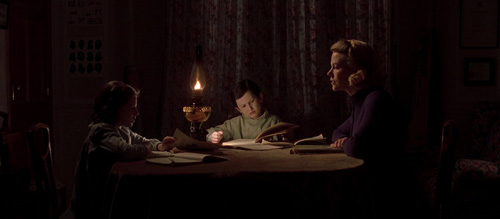The Others (2001) Review
The Others (2001)
Director: Alejandro Amenábar
Screenwriter: Alejandro Amenábar
Starring: Nicole Kidman, Christopher Eccleston, Fionnula Flanagan, Alakina Mann, James Bentley, Eric Sykes, Elaine Cassidy
The horror genre is always in flux, constantly reinventing itself with each new generation. Whether it’s breathing new life into tired tropes or rewriting the rules of the genre itself, horror never fails to find a way to terrify and delight us. More than any other genre, horror shows us what we’re afraid of, what keeps us awake at night. As our fears evolve and change, so do the stories we tell, but there are some fears that never go away. Written and directed by Alejandro Amenábar and released in 2001, The Others is a gothic thriller that explores those primal fears. With breathtaking visuals, a singular performance from Nicole Kidman, and a twist so obvious you won’t see it coming, The Others is still captivating and frightening today, nearly two decades after its release.
The year is 1945. The war is over and the Nazi occupation of the Channel Islands has ended. Grace Stewart (Nicole Kidman) lives with her two children in relative isolation in a grand manor house, hoping and praying that her husband (Christopher Eccleston) will return home from the front. Because her children suffer from a severe allergy to light, Grace lives her life in perpetual darkness, desperately clinging to her faith. But when three servants show up unexpectedly, strange things begin to take place. Things Grace cannot explain. It’s not long before she begins to suspect that something – or someone – is haunting her home.
The Others owes a lot to the films of Alfred Hitchcock, and other suspense thrillers from the 40s and 50s. It’s apparent what kind of film Amenábar is trying to emulate and he has a firm grasp on what made those films so thrilling and unnerving. It’s an old fashioned ghost story, a return to form. In an age where spectacle and special effects films dominate the industry, The Others is proof that old techniques still work. There is no blood and gore – there are hardly any jump scares. What’s scary about The Others is what we don’t see, what’s lurking in the shadows. Footsteps on the stairs, a piano that plays by itself. Amenábar plays on our fears of the unknown, making us feel like children again, grasping in the darkness to turn on the light.
But the light cannot save you in The Others. Because of the children’s allergy to light, the daytime is harsh and cold – unforgiving. It allows for one of the most terrifying moments of the film, when Grace awakens and finds every single curtain in the house taken down. Sunlight pours through the large windows as Grace frantically moves through the house, her children hiding underneath her robe. In The Others, you cannot simply turn on the light or wait until morning, the anxiety is an undercurrent throughout the film.
Cinematographer Javier Aguirresarobe paints The Others in dreary greens and blues, drenching it in gothic imagery. The film is constantly bouncing back and forth between darkened corridors, overcast skies, and golden candle light, but it all feels so seamless and purposeful. For a film that is played half in the darkness, you never miss any of the action. The camera is both static and sweeping, lingering just long enough to unnerve us. Accompanying the visual language of the film is a score by none other than director Alejandro Amenábar himself. The music is at times eerie and foreboding and at others whimsical, almost childlike. These moments of lightness offer a reprieve from psychological horror, giving us a fleeting chance to catch our breath.
For all of its flair and style, The Others is not without substance. The story feels deeply personal, probing us to question our own steadfast beliefs. Amenábar understands how frightening it can be to question your faith, to doubt everything you’ve ever been taught. The Others is a ghost story, yes, but it’s also about mortality. For someone like Grace, someone who believes in God, the very existence of ghosts is a threat to her whole world view. Where do we go when we die? Are we saved? Or are we doomed to wander forever in a kind of limbo, unable to rest. Is there is even such a thing as peace?

The film hinges on Nicole Kidman’s performance; her journey is the through line of the film. Kidman’s physicality is incredible. As Grace, she is stiff and controlling – she stands up straight, almost rigid. Everything about her is controlled and meticulous. It’s incredible to watch her slowly unravel, to see glimpses of her vulnerability and fear. She walks a fine line and Kidman manages to humanize Grace even in moments of anger and cruelty. Another performance of note is that of Christopher Eccleston – pre-‘Doctor Who’ fame – who plays Grace’s husband Charles. His screen time is limited, but his presence is powerful. He conveys a depth of loneliness and guilt without saying very much at all, and when he does he manages to utter one of the most disturbing lines in the whole film…
“Sometimes I bleed.”
His homecoming and argument with Grace is one of the most emotionally charged scenes in The Others. It’s reminder of what war can do to someone, what the very real effects of the occupation were on the people who were forced to endure it. There’s no peace in his departure. No closure. Like Grace and her children, he’s doomed to wander forever in the fog, searching blindly for a way to return home.
The third act of the film comes fast and hard, culminating with a twist that punches you in the gut. It’s a horrifying realization that hides in plain sight. Of course it ends this way, it’s inevitable. But knowing what’s coming doesn’t make the ending any less satisfying. Repeated viewings of The Others only enrich the experience.
“I was brought up in Catholicism,” Amenábar said in a nitrateonline interview shortly after the film’s release. “And religion gives you the answers. I think it’s not good to think we have the answers.” The Others is a film about what happens when our beliefs conflict with our reality, when our prayers go unanswered. It’s about our fear of death, our anxiety about not knowing what happens to us when we leave this world. It’s frightening to think that we don’t have all the answers, but there is a relief in accepting it. In the end, the sun comes out and Grace and her children step out of the darkness. The fog lifts. The war, at last, is over.
Score: 23/24
Written by Margaret Roarty
You can support Margaret Roarty at the following links:
Twitter – @ManicMezzo
Podcast Instagram – @justmythoughtsonitpod
Podcast Twitter – @thoughtsonitpod
Listen to Just My Thoughts on It – Anchor


